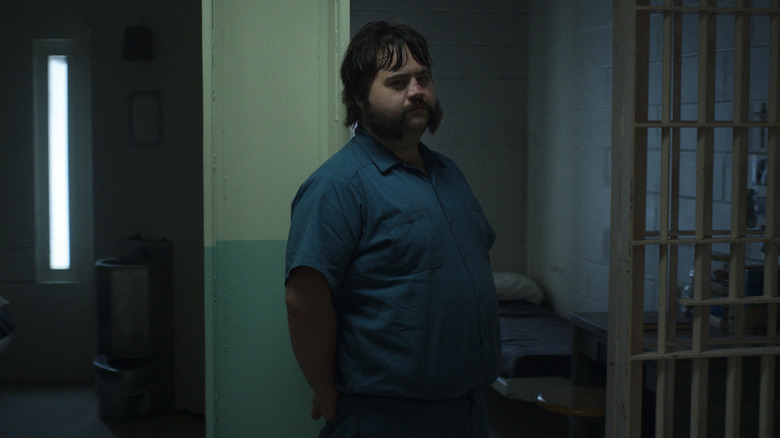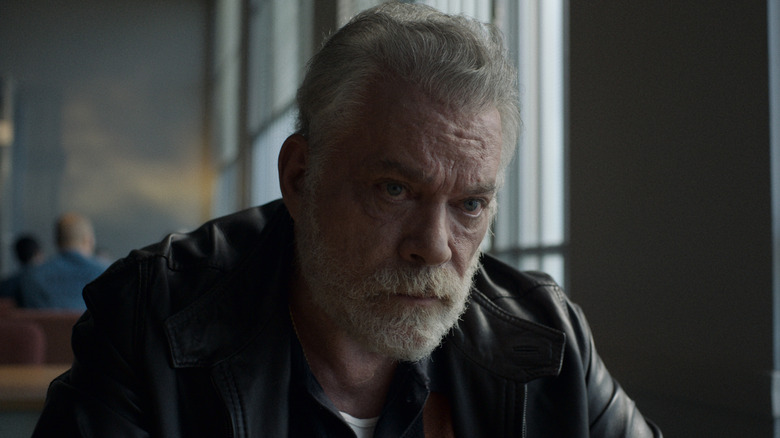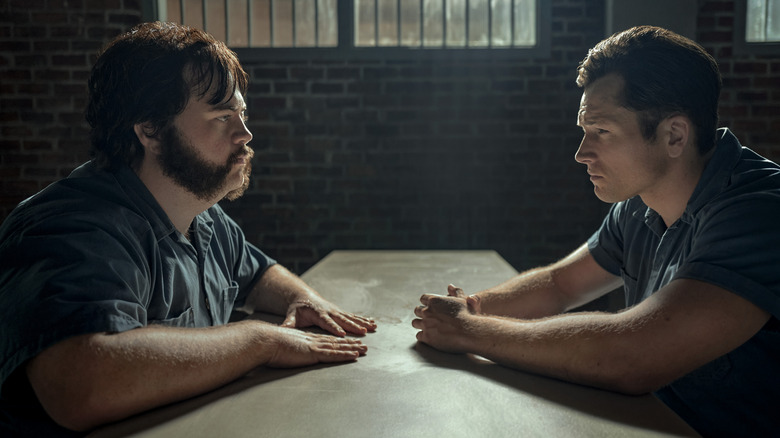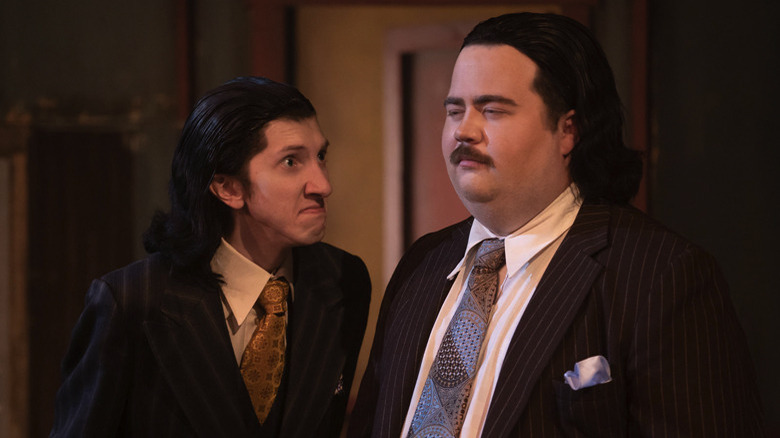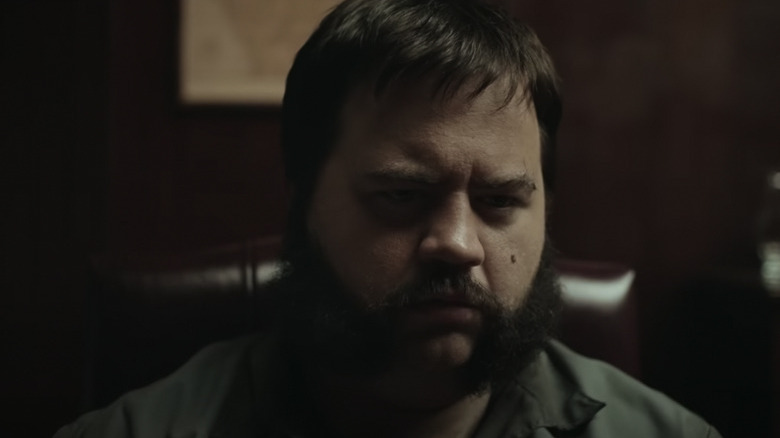Black Bird's Paul Walter Hauser On Mimicking That Distinctive Voice, I Think You Should Leave, And More [Interview]
Paul Walter Hauser has range, folks. The actor, who broke out in 2017's "I, Tonya," seems equally comfortable playing goofy comedic characters as he does portraying creeps and weirdos. In the new Apple TV+ drama "Black Bird," which comes from crime novelist Dennis Lehane ("Mystic River," "Shutter Island") and is inspired by a true story, Hauser delivers one of the best performances of his career as Larry Hall, a serial confessor who might have murdered several young girls in the Midwest in the 1990s. The series is a showcase for two powerhouse performances from Hauser and co-star Taron Egerton ("Rocket Man," the "Kingsman" franchise), who plays a convicted criminal who tries to befriend Hall and elicit a confession before the possible killer is let out of prison on appeal.
I recently had the chance to catch up with Hauser to talk about the duo's on-set dynamic, developing his take on Larry Hall's unsettlingly high-pitched voice, the time he creeped out the late Ray Liotta, and the "cosmic gumbo" of working with comedian Tim Robinson on "I Think You Should Leave."
'I creeped out Ray Liotta'
When you initially read the scripts, was there a specific scene or moment when things clicked into place for you and you knew how you were going to portray Larry?
I mean, I auditioned for the role, so I kind of had to know how to play Larry from the get-go. I didn't have it all figured out or ironed out in its entirety, but I definitely had an idea of what to do. So one thing I keep telling people in these interviews, which is true, at the risk of being redundant: So much of it is about playing the life of the mind, the environment in Larry's head, while also living in the external environment around him. And putting your foot in two different worlds at the same time mentally, I think is the key to playing him. And then just committing, over-committing, to, "I'm not going to worry about vanity, I'm not going to worry about creeping out a crew member, I'm just going to be Larry, and everyone's going to have to deal with it for 10 hours."
And I don't say that like a Method actor. I'm not that, but when you're doing it ... a good example — there was a physical altercation moment with Jimmy Keene and Larry Hall, and by take three, I think I was sticking my fingers in Taron's mouth. That's not scripted, and Taron was probably like, "What the hell is this guy doing?" But I have to follow that commitment and that guttural stuff, or you don't get some of the best work. There are some things that are in the show that I either improvised or did at like an 11 out of 10, and they made the cut of the show. So I'm like, "Okay, well, that's a lesson to me that I can't ignore those instincts or be afraid to try things because they might be the best ones."
Did you ever hear of an instance where you did end up creeping out a crew member?
Yeah, I creeped out Ray Liotta. There was this [specific] line in this scene, and when we cut, Ray just looked at me and went, "Ho ho ho ho, buddy," and kind of rolled his eyes and was deterred from me in that moment. But it also felt like a sign of approval. It was cool.
'I look at Taron a bit like Evander Holyfield, and I'm a bit like Mike Tyson'
So you mentioned Taron, and I know that, "Tell me about working with so and so," is the most basic form of question in situations like these, but I am genuinely interested to know what your dynamic was with him because your characters spend so much time together. Do the two of you approach the work in a similar way or does your process look different from Taron's and you had to find a way to develop a collaboration that worked for you both?
I think we worked together really well. I think Taron is a bit more ... he's a proper actor. He's like a world-class athlete of an actor. I don't mean physically, obviously, I mean in that world. So I look at Taron a bit like Evander Holyfield, and I'm a bit like Mike Tyson. I'm a decent boxer, but I also might bite your ear off, and I think we were able to work in tandem quite well. And even though we have our differences in approach on occasion, the only real approach is to tell the truth and commit. And I think we both did that.
Was there a scene that you were either dreading or excited to shoot and then did the experience of actually filming that live up to your expectation?
There's some heavy dialogue, man. Like episode 4, we're in that cafeteria and we're talking the whole show, so that was exhausting. When I had to think about memorizing all that, I was not super excited. Episode 5, I got a monologue that was really difficult emotionally to say. I have to say some things I don't like. In episode 6, without giving any spoilers away there, there is a moment where I lose myself a bit, and I think that scene was fun because I got to purge the character a bit. It was like I was vomiting out all this pent-up discomfort from playing him, and I was really pleased with how that turned out, yeah.
'I've been using the term cosmic gumbo in every other interview'
I have to ask you real quick about your time on "I Think You Should Leave." I'm just curious how you got involved with that show, and what do you remember about filming that Wife Joke sketch. We're big fans of that show at /Film.
It's so funny you brought that up because my publicist and I were watching a clip from that show, the junket thing with Santa Claus, and in the sketch, Santa keeps saying that something was like a "cosmic gumbo" when he is doing a press junket. So I've been using the term "cosmic gumbo" in every other interview I've been doing, and whenever they yell cut, I'm just cracking myself up like, "Okay, I got five. I'm going to do five more."
I love that show. I was a huge fan. I found out Tim Robinson and I share an agent at CAA, so I emailed my agent and said, "Please tell Tim I'm a fan of the show, and if there's ever anything for me to do, I'll hold the boom mic on that set." I just adore that show, and then he invited me to be in season 2, which was super cool.
So you've obviously worked with really incredible directors — Spike Lee, Clint Eastwood, the list goes on — but you've also been in some really fantastic TV stuff over the years: "Key & Peele," "Community," "It's Always Sunny," "The Afterparty." That is a hell of a list. So I was just curious how important it is for you to jump back and forth between comedy and drama. How cognizant are you of decisions like that in your career? Do you have a trajectory that you see for yourself, or do you make decisions project by project?
Things kind of just get offered. Early on, it was auditioning and just trying to get any job you could. But I do have background in stand-up comedy and improvisation training at schools and stuff, and I think that lends itself to comedy. So I'm always down to do comedy. I'm always down. It just has to be something I'm a fan of so I can stand by it. I could someday be at the level of, fill in the blank famous actor, and I would still go do an episode of "It's Always Sunny." Imagine if Tom Cruise or Julia Roberts did an episode of "It's Always Sunny." People would lose their sh*t. And that's just my heart. My heart is to be able to have fun and not take it too seriously and know that this is all temporary anyway. You're never going to see a U-Haul following a hearse, as I've heard Denzel say. So why not have some fun and go do "Reno 911!" while also doing a Watergate biopic? Why not?
'It sounded like a dying baby squirrel'
What's your favorite memory from filming "Black Bird?" It doesn't have to be a scene that made it into the show, just something that happened during production that you think back on and either laugh or appreciate in some way.
I'm a fan of pro wrestling. I watch a lot of this company called All Elite Wrestling on TNT and TBS. And this wrestler I have great admiration for, his name is CM Punk, he did this return where he hadn't wrestled or performed in almost a decade or something. And so the night I was wanting to watch it, I had to film "Black Bird," and between takes, I literally ran out of the studio into the parking lot to watch CM Punk make his debut and do his 10 minute promo in front of the sold-out audience in Chicago. And it was one of those moments where I'm like, "This is a very expensive Apple show, and I'm the second lead of the show, and I'm running off to go watch wrestling." It was kind of irresponsible, but I don't know, the perfect depiction of who I am as a person, which cracked me up.
Tell me a little bit about the voice. Larry's voice is so distinctive, even to the point where Sepideh's character imitates you on screen at one point. So how did you go about developing that?
That was his real voice. There were like 12 seconds of composite audio of Larry Hall from some documentary on YouTube, and it was cartoonishly high. It sounded like a dying baby squirrel or something. It was just so weird. And so I tried to take it down a notch from like a 10 to an eight and embody that. I think his real voice is a bit deeper. And then when I'm insecure, I'm playing the version of Larry that Larry wants to project, the voice would get a little bit higher. Psychologically, there was a reason for it to ratchet up, but really it is sort of a cosmic gumbo between his real voice and my interpretation.
"Black Bird" debuts on Apple TV+ on July 8, 2022.
